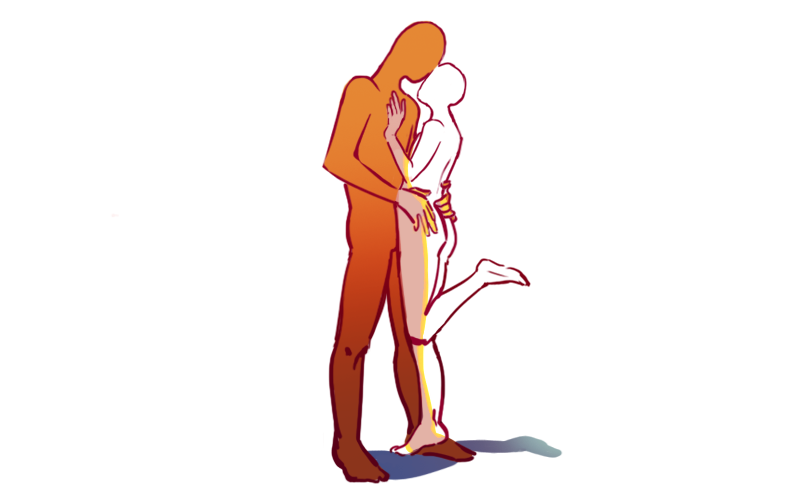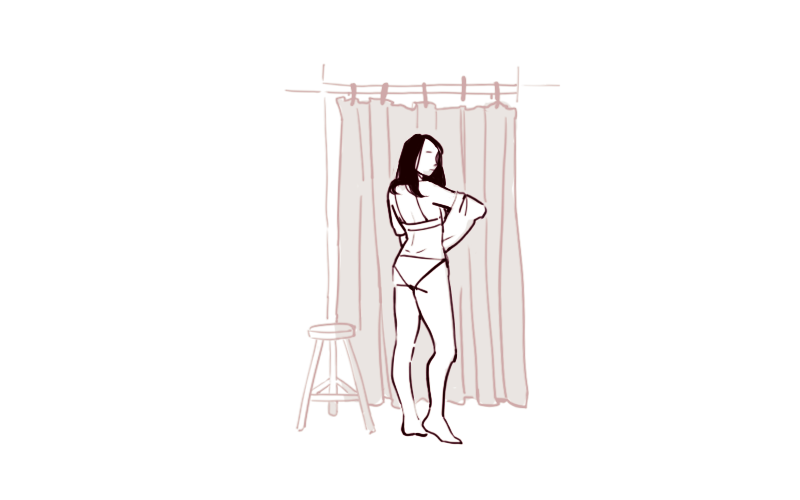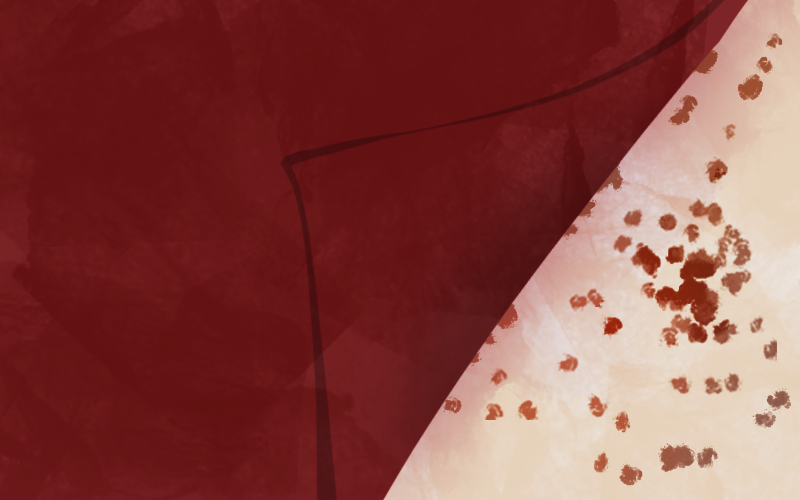I’d never had a sober sexual relationship. “Honestly non-monogamous,” read Rob’s online dating profile. At the beginning of 2018, I was just two weeks out of my five-year affair with alcoholism, but I was still perusing the same apps I’d use to find men who might buy me drinks. Armed with no 12-step program, just my own desperation, I passed the days doing anything that would fill time. I loved the idea of men. I thought to find one might brighten the landscape of an otherwise dark, blank future.
In retrospect, I may have been hungry for chaos. Laughably intricate webs of romantic encounters had distracted me from the reality of my substance abuse, each one spun from my own jealous and narcissistic rage. I shuddered at the hypocrisy of my last relationship, in college. Throughout our two year affair, I suffered fits of angry mania over my boyfriend’s glances in other girls’ directions, though I was cheating on him at least every other weekend. It didn’t count, I thought to myself because I didn’t care about those guys on the side. I never set out to commit adultery, but I never endeavored to blackout either. Both seemed to happen as if by fate, by some divine force beyond my control. Meanwhile, the remote possibility my boyfriend could even momentarily yearn for another threatened the fabric of my fraying self-worth.
Upon reviewing Rob’s profile, I briefly contemplated the parameters of an alternative relationship. I finally resolved, “I’ll just do this until I go crazy.” At 48, he was 26 years my senior and boyishly handsome, exuding a winning combination of vitality and intellect. He was a writer and photographer with a lengthy education in linguistics, capped off by a stint teaching. I knew that if I’d had him in class, I would have ached after him ceaselessly. I hypothesized that I would eventually develop familiar territorial feelings for him, which would violate the terms of our engagement. I promised myself that at that point, I’d dip.
After our third date, Rob and I started having sex. It required a leap of faith that surprised me, considering the extensive sexual resume I’d acquired over the years. The tension leading to our first kiss nearly choked me, but the moment our lips touched, I felt the suffocating force surrender to the wayside. Our sex taught me what sex should be. I soon realized the implications related to the fact that out of the nearly 80 people I’d slept with while drinking, I only fully recalled my encounters with four. Afterward, Rob and I would collapse in a heap, enjoying the fleeting intimacy in our otherwise emotionally sterile arrangement. Settling into a desultory embrace, we’d talk about politics, our families, our experiences with drugs. Sometimes we’d lay in contented silence, and I’d watch my thoughts float by like clouds in a clear January sky while I mussed his greying chest hair.
Rob became an integral component of my nascent experiment with sobriety. He had lived all over the world before returning to the apartment where he’d been raised on Manhattan’s Upper West Side. The home he looked after throughout his father’s old age was rent-stabilized, a six-room dwelling from the era when regular middle-class folk could thrive in the neighborhood. It clearly hadn’t been redecorated since his youth, and I padded across its creaky wood floors imagining I might run into Lou Reed on my way to Zabar’s. In those early days, he provided me with a sensation I now encounter regularly: the knowledge that my present position in life encompasses all that I’d longed for in my youth. This, paired with the sense of taboo I gained from dating a significantly older man, occupied the gaps of intrigue that recovery had left vacant.

I admired Rob on a cellular level, though I knew he was sleeping with other women. Getting ready for work one morning, I pulled a hairbrush from the mirrored cabinet above his sink. I examined the hairs stuck in its bristles, wondering if I could find any concrete evidence of my silent female cohorts. I caught myself and put the brush down. I learned to stop asking questions I didn’t want the answer to.
We met for dinner every week, and I’d beam at the elevator attendant as we ascended to his eighth story abode afterward. Rob disliked alcohol on the grounds that it disagreed with his stomach, but he was an avid pot smoker. One night, stoned and sprawled out in that same blissful jumble, we talked through my sobriety. “You’re doing a good job now,” he said, “but it will be interesting to see how you handle a real problem.” I paused, paging through the possible negative circumstances that might spur my relapse. My job as a salesgirl in a luxury boutique seemed stable. I didn’t do much besides work there, workout, and sleep with Rob. My grandparents are incredibly dear to me. Their passing appeared the only thing that could ignite a tailspin.
“I guess you’re right,” I exhaled.
My pink cloud of sober ecstasy peaked at 90 days. The milestone coincided with a visit from a college friend named Maggie. I hadn’t seen her since the depths of my drinking when my then-boyfriend and I had held court in his cigarette-scented apartment on Hughes Avenue in the Bronx. The last time we’d hung out, it’d been in the company of the many bottles of vodka and cans of Rolling Rock he and I procured for every occasion. I relished the opportunity to present this improved version of myself to Maggie. This version had clean bath towels on hand and a fridge filled with greens.
Maggie and I spent the first day of her visit on a stroll to Coney Island. The next day, we attended an MGMT concert in Williamsburg. Disembarking from the L train, she scratched at her stomach. “There must be a mosquito in your room. Or maybe a spider? I have these bites all over me,” she said. “Seems a little early in the year for mosquitos,” I replied, tugging my jacket sleeves down against the brisk March evening.
A week after Maggie’s departure, I spent another afternoon alone in Williamsburg, sifting through silk skirts at Stella Dallas. Sobriety had granted me what felt like an exorbitant amount of disposable income, and I channeled the new resources into revamping my appearance. I fancied myself a promising fixer-upper. Glancing down at my phone, I noticed a message from Maggie. “I hate to be the bearer of bad news, but several friends here in Colorado have told me my bites are from bed bugs. You definitely have them. I’d recommend fixing the problem now before it gets worse.”
My modest bosom swelled with rage. I brought my selections to the fitting room and examined every inch of my body for bites. I didn’t find anything, but I did find one of the skirts enchanting. I left the store, bag in hand, and called Rob. “Listen to the nerve of this girl,” I began. “Do you think I have them?” I ended. I could hear his computer keyboard clicking in the background. He told me it could be possible, that 30 percent of people show no reaction to the pests.

Still convinced of my innocence, but wavering slightly, I returned home to peel the sheets off my bed. It wasn’t until I removed my memory foam mattress topper that I found the damning evidence, one single shell, lodged into its dead center. A white-hot panic animated my fingers as they dialed the first exterminator Google presented. He arrived to inspect my bedroom 90 minutes later. Taking one look at the scarlet letter I’d discovered, the inspector told me he’d likely find many more, that this was a late-stage situation. By his estimate, I’d had them for six months.
I worried that I might be breaching the tacit terms of our non-monogamous relationship, but I called Rob within a heartbeat, unsure of who else to call. “You were right,” I told him, dangling above a teary precipice. “Can I stay with you tonight?” I left at midnight with the clothes on my back and the face wash from my shower, headed for Rob’s apartment, frozen in a memory of New York, eight stories above reality. He let me stay the next two nights there, without question.
I finally returned home on Easter Sunday to confront the mess. I lived in the third story apartment of a friend’s childhood home and paid my rent in cash. Without a lease or written legal agreement, landlord-tenant protections didn’t apply to me. I would have to handle the situation on my own. Another bootleg exterminator met me at the staircase, and I watched him spray my room with pesticides while he dictated instructions. “Wash your clothes, dry them on high heat for an hour. Store them in heavy plastic garbage bags.” When he left, I began my laundry in a frenzy.
A strange thing happened while I rolled my contraband down South Brooklyn’s Bath Avenue. Amid the stark contrast between my circumstances and the lovely families all dressed in their holiday best, I found empowerment. Sure, this was a nightmare, but it was something tangible to fix. The first few months of my sobriety had become monotonous. The unrelenting cycle of self-improvement and compartmentalized sex left my need for trouble wanting. Finally, I had a new force to rail against. I committed to my battle with a warrior’s determination and hummed along with all six shuttles between my apartment and the drying machine.
My “situation,” as Rob termed it, became a major talking point in our non-relationship. The solace I’d previously found in his apartment acquired a new responsibility. It was the only place I could sleep comfortably during this period where I lived on an IKEA futon in my kitchen, keeping all the lights on so I could stand sentry against wandering bugs until my eyelids grew heavy.
Every week he’d ask for updates, sustaining my fight to restore normalcy. “How’s your situation?” He’d ask. Were they gone? “No,” I’d always reply. The chemical treatment took three weeks. When that didn’t work, I had the carpet steamed, then subsequently tore it up using the steak knives my mother bought me for Christmas. The symbolism of that Kafkaesque effort struck hard and swift. When I pulled up the carpeting I’d so meticulously hacked at, I found it littered with countless splotches of dried blood. My own, I figured, the result of stepping on bugs as they lurked my floorboards. Over three months into sobriety, I found myself staring at my own preserved bodily fluids and wondering how much of them had been saturated with alcohol. “Are they gone?” Rob asked, a month into the “situation”. “I think so,” I eventually sighed. I’d bought a new bed.

Even after removing my carpet, the pests still weren’t gone, but my original will to fight was. On the last day of its presence, I salivated at the sight of the new mattress sitting in my kitchen. “What’s the difference? I thought it would be there regardless of whether I slept on it or not. Paranoid as ever, I conducted a cursory inspection before shutting the lights off, only to find a tenacious critter scurrying towards the vein on my forearm. In that moment, the cracks shattered straight through my sanity. I threw out every non-essential item, including my grandmothers’ fur coats and my father’s childhood records. I finally decided to move, out of sheer exhaustion, to leave the home where I’d gotten sober. These were sentimental items of a life since past, I tried to reason, one filled with hangovers and one night stands. It was time to enter a new phase of living.
The week after, Rob didn’t ask about my “situation.” I supposed he’d stopped asking questions he already knew the answers to. I didn’t tell him yet that I was moving, that I’d purged myself of the relics from another existence. When I arrived at his pristine apartment, weary from defeat, we wordlessly got right into the sex, wild gymnastic sex. When I peed afterward, I didn’t stop to check the trash can for another woman’s tampons. Overwhelmed by reality, I allowed myself the sweet indulgence of eschewing practicality. I returned to Rob’s room and fell into his arms. •




